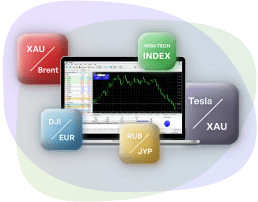- Education
- Introduction to Trading
- Forex Trading Myths
Myths About Forex Trading

Forex is a roulette game where some people win a lot and others lose.
Forex is not a roulette because in the core of currency price fluctuations there are certain principles. First of all, currency price depends on its country's economic performance. Secondly, it is linked to preferences and expectations of Forex players. It is all a subject of prognosis which is proved by market analysis containing objective factors rather than casuality.
It is commonly accepted nowadays that risk is an inherent part of any business activity. You may not always have the result you planned from a deal. But it is especially risky to be involved in trading. Due to the complexity and unpredictable nature of market's behavior it is easy to suffer losses and there is never a 100% confidence that the result is going to be positive. Many are put off from work in the financial market despite the much easier access to it thanks to modern communication technologies and powerful analytical trading software packages.
It is also well known to everyone who has ever taken part in any of business activities that divergence between planned and actual results is inevitable. There are all sorts of unforeseen but still highly influential factors like economic or political changes, natural disasters and many more. Thus, it may be assumed that risk is an inherent part of any activity. The only way to avoid risk is to do nothing.
One trader's win is another's loss.
By no means all players in the Forex market are seeking to make profit from price fluctuations. There are also such players who use currency exchange operations for other purposes (exporters, importers, large investors and others). For these players short-term changes are not significant. The main clients of such operations are export and import companies. Selling their products abroad, they obtain the currency of the country, where sales take place. To invest this money into production they need currency of the country, where production is located. Under orders of such companies, banks (or brokers) execute conversions. It is because currencies can be converted one into another easily at the floating market rate, such operations may become a source of profit themselves. Nevertheless, any financial market is a place of reallocation of resources.






